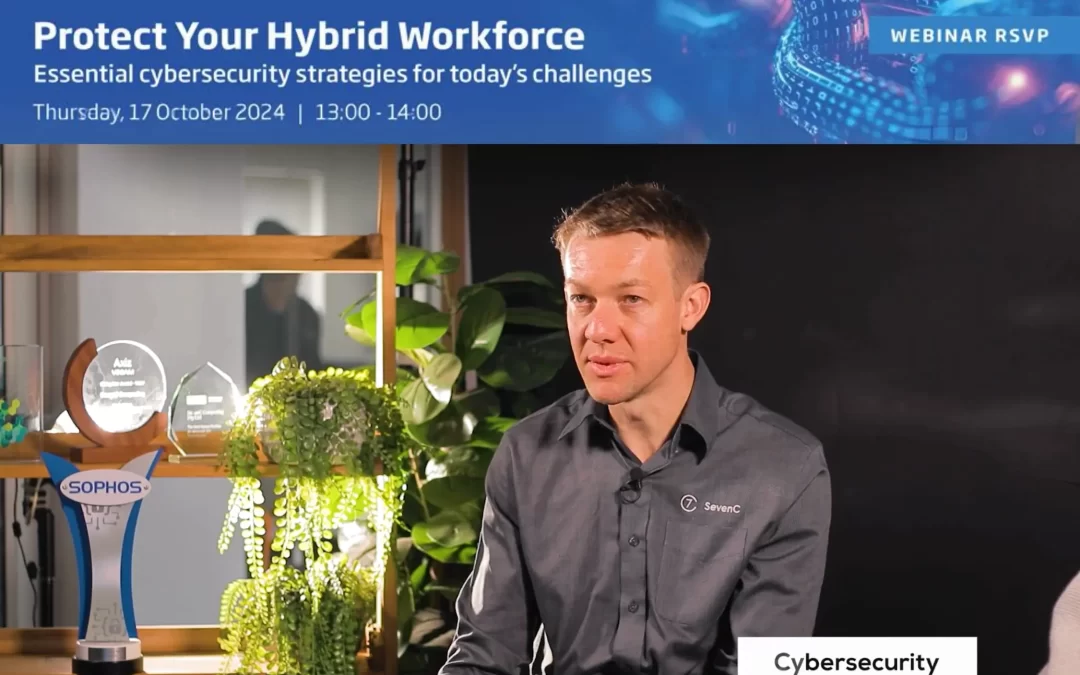Essential cybersecurity strategies for South African SMEs – ransomware, phishing, and data breaches – what you need to know.
“As cybercrime continues to rise globally, South African businesses, especially small to medium-sized enterprises (SMEs), are increasingly at risk. Recent reports reveal a staggering 300% rise in cyberattacks, and South Africa ranks third globally in cybersecurity vulnerabilities. With businesses relying more on hybrid workforces, the need for robust cybersecurity strategies has never been greater.” says Graeme Millar, SevenC Managed IT Services Managing Director.
During our recent webinar, hosted in partnership with Tarsus Distribution, Sophos, and ASG IT Support Services, we discussed the evolving cyber threat landscape and shared practical strategies that organisations can adopt to safeguard their networks. Watch the webinar below.
The key question is why are businesses still being breached despite having security measures in place?
SMEs, in particular, are a prime target because they often lack the resources and expertise to keep up with the latest security challenges. This is due to a few factors.
According to Millar, “Many businesses find the rapidly evolving nature of cyber threats overwhelming. The technology, skills, and processes required to stay secure are often inaccessible to SMEs. Then there is the cybersecurity skills gap. Many businesses don’t have access to the expertise required to manage and maintain complex security solutions. Governance is absolutely key to managed cybersecurity risks, requiring strategic, forward-looking management rather than day-to-day reactive management.”
Millar continues, “Many businesses believe they won’t be targeted, assuming they are too small or that a simple antivirus will work. However, cybercriminals increasingly target SMEs precisely because of this approach, knowing they often lack the robust security infrastructure and staff education of larger companies.”
“The good news is that with the right IT partner for cybersecurity solutions, you can secure your business effectively and at a cost that suits your budget and requirements” he adds.
So, what are the primary threats that businesses currently face?
Ransomware is a significant threat. Businesses are not just randomly targeted; attackers conduct thorough research and develop targeted strategies to ensure maximum disruption in exchange for businesses paying a ransom to the attackers. Data and credential theft is another significant threat – not only to businesses but also individuals. Customer data, intellectual property, and business-critical information are gold mines for attackers. “We’ve seen a rise in attacks aimed at compromising backups, leaving organisations unable to recover their data” says Millar. And then there are phishing attacks where human error is often the weakest link in the cybersecurity chain. Phishing attacks are where malicious emails trick users into sharing sensitive information or downloading malware, are one of the easiest ways for attackers to breach an organisation.
Millar explains that a layered approach to cybersecurity, where multiple security measures work together, creates the most robust defence for a business. This should include a well-thought-out security strategy, a strong attack response plan, a data back-up and recovery solution and employee education and training.
Says Millar: “A good strategy includes a robust firewall can block malicious traffic before it reaches your internal network, endpoint (device) protection for your employees be they in office or remote and sound email security with filtering solutions are essential to block malicious emails before they reach your users.”
“Every business must have a documented and practiced incident response plan (IRP) with the steps to take when a breach is detected, including isolating affected systems, contacting relevant personnel, and restoring data from secure backups.”
“Cyber attackers increasingly target backups, knowing that compromised backups leave businesses with no way to restore their data without paying a ransom. Therefore, businesses must ensure that backups are encrypted and stored in multiple locations, including offline storage, to prevent ransomware attacks from reaching them” Millar outlines.
Human error remains the number one cause of cyber breaches. Millar is a strong advocate for regular awareness training with testing of employees’ awareness. The market has some great tools, such as the Sophos Phish Threat simulator which can help identify potential vulnerabilities in your workforce.
For many businesses, the question isn’t whether they’ll face a cyberattack, but when. We learned that 7 out of 10 companies in South Africa will be impacted by some form of cyber attack. Businesses face the threat of operations being shut down for days or weeks; the financial and reputational damage from compromised customer or employee data or the encryption of essential business IP as part of a ransomware attack. Cyber threats don’t just disrupt – they have the potential to shut down businesses entirely.
Contact SevenC Managed IT Services today to discuss how we can help secure your business and protect your critical data.

Recent Comments